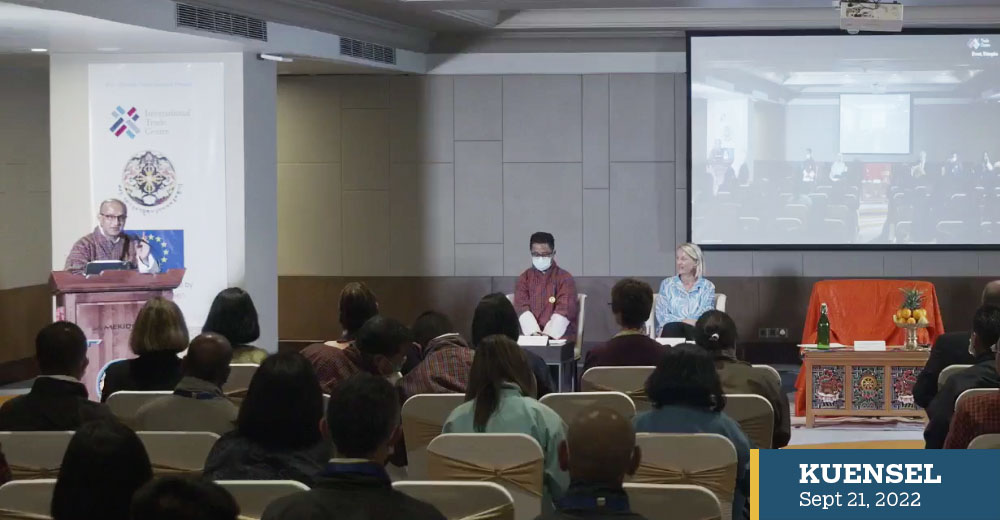Thukten Zangpo
The Bhutanese traditional products by artisans and farmers, gained access to international markets with the support of the European Union (EU)-Bhutan Trade Support Project.
Four years after launching the project in May 2018, it came to an end on September 19 with a display of businesses supported by the project.
The project has helped link 1,400 artisans, farmers and small and medium enterprises (SMEs) in horticulture and textile handicraft sectors to 11 export markets.
The project worked with communities across the 20 Dzongkhags in the country.
“The efforts have resulted in an increase in incomes along the two value chains leading to economic growth and poverty reduction,” according to the International Trade Centre (ITC).
In line with Bhutan’s “Brand Bhutan initiative”, the project has been instrumental in strengthening the SME sector by becoming export competitive with a focus on empowering women entrepreneurs and economic and environmental sustainability.
International buyers showed great interest in Bhutanese products and placed new orders, even during the Covid-19 pandemic. Products such as honey, chilies, lemongrass oil, cardamom, ginger powder, turmeric powder, herbal tea, and mushrooms saw demand.
Under the project, 320 new designs of textile handicrafts were developed and more than 2,000 units exported to Europe, Asia, and the United States of America.
Bhutan Textiles has exported more than 2,500 products worth over Nu 10.4 million (M) to 66 clients in 14 countries-the United States of America, the United Kingdom, Japan, France, Belgium, Germany, New Zealand, Switzerland, Netherland, Spain, Italy, Monaco, Norway, and South Korea.
Nu 2.6M worth of horticulture products were exported to Japan, Thailand, Hongkong, Singapore, France, Italy, and Malaysia.
However, horticulture consultant of ITC, Dr Subedi, said that Bhutanese organic products are yet to get the EU standard certification. “Bhutan is not taken under the geographical indication for the EU market.” He said that because of lack of certification, Bhutanese products cannot be exported in large quantities.
Dr Subedi said that Bhutan Agriculture and Food Regulatory Authority is looking forward to certifying Bhutanese organic products with the third party EU standard organic certification in Thailand.
Founder of Druk Meto or Bhutan Blossoms, Thinley Namgay, said that the business exported products worth USD 50,000 last year in the international market.
Sharing the export challenges, he said that the flight charges are costlier and delays are a problem. Thinley Namgay added that meeting the quality and standards for international market is also difficult. “Most of the farmers involved in collecting the raw materials are not trained.”
He expects to open a couple more retail stores in the international market.
Founder of Jinlab Agroproducts, Kalyan Mahat, said that the project helped the business in capacity building in writing business profiles and also sold his products via a digital platform based in Hongkong. He said that he learned to ensure an attractive packaging, documentation for the ISO certification, maintaining food hygiene, and recalling default products.
Economic affairs minister, Loknath Sharma said, “Trade is an essential part of our economy that provides opportunities for employment and economic development. The EU-Bhutan Trade Support project was timely. It assisted the government in securing new market access for Bhutanese products. The project supported the objectives of the 12th Five Year Plan.”
EU Ambassador to Bhutan and India, Ugo Astuto, said that the SMEs could be engines of sustainable economic growth and inclusive development, besides creating employment.
He added that the project contributed to unlocking the power of SMEs by supporting the national trade policy, building supply-side capacities for export and identifying economic opportunities abroad. “The growing presence of Bhutanese horticulture and handicrafts products in international markets will help in improving the country’s trade surplus and also foster economic recovery post Covid-19 pandemic.”
Ugo Astuto also said that the EU would continue to work with Bhutan in diverse areas and support the country’s transition from the Least Developed Country (LDC) group.
ITC‘s Director of Division of Country Programmes, Ashish Shah said, “ITC has been a long-term partner of Bhutan, supporting economic diversification, sustainable trade, private sector development, and more on Gross National Happiness.”
Although the project came to an end, he said that ITC stands ready to work with Bhutan in support of post-Covid-19 economic recovery, LDC graduation, developing the digital economy, green trade, and climate-resilient SMEs.
The project also helped Bhutan nurture conducive policy environment for the private sector, public-private dialogue, and digital trade.
“The project’s support on Generalised System of Preferences Plus, Sanitary and Phytosanitary Standards and Technical Barriers to Trade has contributed to prepare for Bhutan’s LDC in 2023,” according to the ITC.
The project funded by the EU was implemented by the ITC, a United Nations agency, in collaboration with the Gross National Happiness Commission, the economic affairs ministry, agriculture ministry, and Agency for Promotion of Indigenous Crafts.


